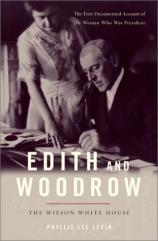Edith and Woodrow: The Wilson White House
Review
Edith and Woodrow: The Wilson White House
Sometime in the near future, U. S. citizens will elect their first
female president. Despite that official mandate, though, said woman
would not be the first female to govern and set policy for the
country. That honor goes to Edith Wilson, wife of Woodrow Wilson,
who held the job from 1913-1921.
In an amazing and long-rumored chapter in American history --- only
fully brought to light in documents released in 1991 --- the second
Mrs. Wilson acted as de facto Commander in Chief while her
husband floated in and out of a comatose state during the last year
and a half of his presidency. Unthinkable in today's mass media,
she shielded the extent of the President's illness and ability to
function both mentally and physically not only from the American
people, but government and White House staff.
Levin's exhaustive and impeccably researched book, nearly a decade
in the making, is not so much a portrait of the intellectual but
stubborn and elitist Wilson as it is of his tenacious and doggedly
protective Edith. After his well-liked first wife died in office,
the depressed President became obsessed with social-climbing widow
Edith Bolling Galt. He eventually proposed only two months after
meeting her --- then waited almost that long for an answer.
Wilson immediately took his wife into his confidence, alternately
soliciting and brashly receiving her opinion on everything from
Cabinet assignments to major policy speeches. Sensitive documents
that even the most highly placed senators would never lay eyes on
were game for the First Lady's dissection. Unfortunately, many of
her views were egregiously colored by personal prejudices and
pettiness, best exemplified in the case of Colonel Edward House.
Once Wilson's best friend, closest confidante, and brilliant
international negotiator, he was eventually shut out of his duties
--- and history --- by a woman who saw no room for competition for
her husband's attentions.
Most of EDITH AND WOODROW --- perhaps too much --- simply sets the
stage for the events of October 1919 to March 1921, again
impossible to imagine in a modern context. Wilson, on the ropes
politically due to his stubborn insistence that America enter the
post-World War One League of Nations on his unbendable terms,
suffered a paralyzing stroke. Rushed back to the White House, Edith
orchestrated an effort admirable in its sheer audacity: With the
compliance of two physicians, she essentially cut off contact
between Wilson and the entire world with locked doors, drawn
curtains, and bland, generic press bulletins.
With Woodrow vacillating being an alert weakness and a
vegetable-like state, Edith controlled all incoming visitors, mail,
and official documents. And even then only choosing which ones to
bring to her husband's attention and which to answer on her own.
Her numerous directives --- always hastily handwritten and
beginning with the phrase "The President says..." --- became
inescapable as the former brilliant orator and political leader
slowly disintegrated into a shuffling, slack-jawed, barley coherent
shadow of his former self.
Policy decisions, signed treaties, presidential directives, and
strong opinions, all in Edith's hand, flowed from the shut off
sickbed room. And on the occasion that a group of senators or media
from the outside world did get a peek in, Edith helped stage
Wilson's appearance on a "good day" with a mastery of PR
manipulation. The heart of Levin's thesis --- backed by voluminous
evidence --- is that the Wilson handling the presidential business
was not the one people assumed, despite Edith's demur
dismissal of her own contributions.
After Woodrow Wilson's death, Edith continued her role as a
one-woman "guardian, publicist, and propagandist" for his political
legacy. Her memoir, considered by even apologists to be prejudiced
and untruthful, glorified Wilson to the point of deification, while
demonizing enemies for offenses ranging from imagined or slight to
truly substantive.
Why history has not hailed Edith Wilson as a role model is one of
the most interesting aspects of Levin's book. Her personal
pettiness, roughshod authority, and haughtiness often made her
wholly unsympathetic. And her one-woman decision to hide the true
extent of her husband's mental abilities not only prevented the
established political succession and the daily business of
government, but left the country essentially leaderless during a
very critical time.
And though it takes too long to get to the meat of a story that is
often written a bit dryly, EDITH AND WOODROW is an intriguing read,
a book on par with a recent spate of biographies/analyses on
presidents, including JOHN ADAMS, ROOSEVELT'S SECRET WAR: FDR and
World War II Espionage, PRESIDENT NIXON: Alone in the White House,
and REACHING FOR GLORY. But none of those have the amazing,
bizarre, and significant revelation of Levin's important book: For
a year and a half, the United States was largely helmed by a
woman...and one who didn't even think her gender deserved the right
to vote!
Reviewed by Bob Ruggiero on January 21, 2011
Edith and Woodrow: The Wilson White House
- Publication Date: September 25, 2001
- Genres: Biography, Nonfiction
- Hardcover: 608 pages
- Publisher: Scribner
- ISBN-10: 0743211588
- ISBN-13: 9780743211581





